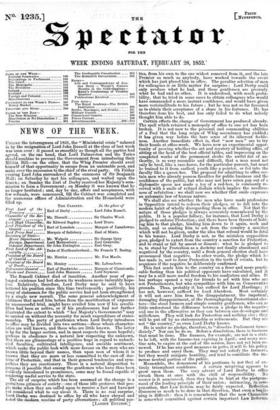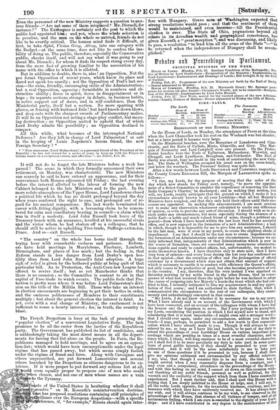NEWS OF THE WEEK.
TIIE CunatEr. In the place of First Lord of the Earl of Derby.. • Treasury Lord John Russell. Chancellor of tha chequer )Mr. Disraeli Sir Charles Wood. Lord High Chancellor.. Sir Edward Sugden Lord Truro.
Lord President of the ) Earl of Lonsdale . Marquis of Lansdowne. Lord Privy Seal Marquis of Salisbury . Earl of Minto. Secretary of State— Home .Department.. Mr. Walpole Foreign, Department.
Colonial Department. First Lord of the Ad- mfralty • President of the Board of Control PIrsident of the Board of Trade
Postmaster-General ... Earl of Hardwieke Marquis of Clanricarde. Woods and Forests.... Lord John Manners Lord Seymour.
The Russell Cabinet died of inanition. Another year of pro- longed existence had but shown its weakness more incurably hope- less. Relatively, therefore, Lord Derby may be said to have bettered his position since this time twelvemonth ; positively, his array of statesmen for the public service had not been strengthened by a single new recruit. The same general acknowledgment of unfitness that saved him before from the mortification of exposure by unsuccessful trial, might have availed him now if his sensibi- lities had been as active, or if his predecessors had not further illustrated the extent to which "her Majesty's Government" may be carried on without the necessity for much expenditure of states- manship. The party of gentlemen whom Lard Derby introduces to office may be divided into two sections—those whose character- istics are well known, and those who are little known. The latter is by far the larger section, and in most respects the more hopeful; perhaps in obedience to a natural law respecting the unknown. But there are glimmerings of a positive hope in regard to unhack- flied faculties, cultivated intelligence, and amiable sentiment, which make the public look with more favour on the men -who are known little beyond their names, than upon men of whom it is known that they are more or less committed to the cast-off doc- trine of Protection, and that in their general tendencies and sym- pathies they are reactionary. There is a natural disposition to presume it possible that among the gentlemen who have thus been suddenly introduced to prominence, some may be found capable of rendering useful service to the state. The air of surprise which has been assumed at the change is a gratuitous grimace of society—one of those idle gestures that peo- ple make when they are called upon to receive a fact and have not I yet considered what to say about it. There is no real surprise. Lord Derby was destined to office by all who have obeyed and noted the modern routine of party alternations ; all political par-
, _1
Sir George Grey Lord M mesbury Earl Granville. Sir John Fakington Earl Grey.
Duke of Northumberland Sir Francis T. Baring.
Mr. Herries . Mr. Fox Hanle.
Mr. Henley . Mr. Labouchere.
ties, from his own to the one widest removed from it, and the late Premier as much as anybody, have worked towards the event which has just placed him in office. The peculiar selection of men for colleagues is as little matter for surprise : Lord Derby could only produce what he had, and these gentlemen are precisely -what he had and no other. It is understood, with much proba- bility, that he tried in some cases to obtain colleagues who would have commanded a more instant confidence, and would have given more verisimilitude to his future ; but he was not so far favoured as to obtain their acceptance of a share in his fortunes. He has therefore done his best, and has only failed to do what nobody thought him able to do.
Certain effects the change of Government has produced already. The spell which retained a monopoly of office to one set has been broken. It is not now to the personal and commanding abilities of a Peel that the long reign of Whig ascendancy has yielded ; it has given way before the bare sense of its inherent feeble- ness. Another immediate effect is, that "new men" are to try their bands at office-work. We have now an experimental oppor- tunity of proving whether the art and mystery of holding office, of sitting at the head of the best official tables, and impressing on the completed works of the permanent clerks the awful fiat of au- thority, is so very recondite and difficult, that a man must not only be bred, like a race-horse, for the particular pursuit, but must be trained to it from earliest youth like a pointer, or fed into the faculty like a queen-bee. The proposal for admitting to *office cer- tain men who already possess faculties for public business and the confidence of the public, but who may not have eaten pap out of a diplomatic spoon nor made a toy of a red-box, is commonly re- ceived with a smile of refined disdain which implies the needless- ness of 'refutation : we shall now see whether that smile expresses an axiomatic law of human nature.
We shall also see whether the men who have made professions in Opposition intend to redeem their pledges, or to fall into the modern habit of wholly disregarding them in office. Not that the nature of those pledges is always accurately remembered by the public. It is a popular fallacy, for instance, that Lord Derby, is pledged to enforce Protection ; and there have been threats of -hold- ing him to that pledge, binding him down to it again, neck and heels, and so sending him to ask from the country a sanction which will not be given, under the idea that refusal would be fatal to his tenure. Lord Derby is not, as the mistaken supposition goes, pledged to extort from the country a sanction for Protection, and to stand or fall by assent or dissent : what he is pledged to is, to stand by Proteotion as a doctrine not finally abandoned and negatived by the country, until a fresh general election shall have pronounced that negative. In other words, the pledge which he has made is, not to force Protection in the teeth of events, but to acquiesce if the negative be deliberately confirmed.
This fact sends him to the country on a freer and more practi- cable footing than his political opponents have calculated, and it may be a still more useful freedom to his coadjutors and allies. It has perhaps opened a way for friends to act with him who are not Protectionists, but who sympathize with him on Conservative grounds. Thus, probably it has sufficed for Lord Hardinge ; it has not, however, sufficed for Lord Aberdeen. Most certainly it will not save him from the disappointment, the impatient, damaging disappointment, of the thoroughgoing Protectionist elec- tors—the stout farmers and simple country gentlemen, who can as little understand the difference between a pledge in the negative mid one in the affirmative as they can between eau-de-cologne and millefieurs. They will look for Protection and nothing else ; they Will be put off by no statesmanship or refinements. But they are not "the country," as even Lord Derby knows.
He is under no pledge, therefore, to "dissolve Parliament imme- diately." Nor can he do so. Before a dissolution, there is business that must be done. The finances, for example are not in a state to be left, with the Income-tax expiring in April ; and ninny rou- tine ads, to expire at the end of the session, have not yet been re- newed. If he has any good measures in petto, it will be his policy to produce and carry them. They may not satisfy the farmers; but they would mitigate hostility, and tend to conciliate the im- mense neutral portion of the public.
Meanwhile, the demeanour of his partisans is not that of en- tirely triumphant confidence. A certain misgiving appears to grow upon them. The very advent of Lord Derby to office struck them at once with the chill of responsibility. No sooner is it announced, than they begin. to hint at the postpone- ment of the leading principle of their union ; intimating, in com- pensation, that Law Reform may be fairly expected. Reflection discovers so much to be done in that direction, that even a begin- ning is difficult : then it is remembered that the new Chancellor is somewhat committed against certain important I.,aw Reforms.
Even the personnel of the new Ministry suggests a question to anx- ious friends—" Are not some of them misplaced ? Mr. Disraeli, for instance?" The Exehequer is certainly not the post to which the public had appointed him ; and yet, where the whole selection is so peculiar, and the men on the whole so untried, friends do not like to be overtly critical. The human mind finds it difficult, at first, to take Sybil, Vivian Grey, Alroy, into one category with the Budget—at the same time, does not like to confess the ina- bility of doing so. The public, therefore, especially the Conservative public, cheeks itself, and will not say what it was going to say about Mr. Disraeli ; for whom it finds its respect rising every day, from the mere fact of growing familiar to the association of his name with the office to which it is allotted.
But in addition to doubts, there is, alas ! an Opposition. Not the pro forma Opposition of recent years, which knew its place and dared not speak too saucily ; not the Opposition of Peel's last ses- sion—the calm, friendly, encouraging critic of the Administration; but a real Opposition, opposing ; formidable in numbers and ob- structive ability ; fierce in spirit, fierce in disappointment or in hope ; its separate sections stronger in debate, in business habits, in active support out of doors, and in self-confidence, than the Ministerial party, itself but a section. No more sparring with gloves, or fencing with buttoned foils ! but hard knock-down blows, and deep cuts with the sharpest swords of Parliamentary malice. It will be an Opposition not acting a stage-play conflict, but mean- ing destruction ; an Opposition united to uphold that of which Lord Derby admits the possibility ; an Opposition destined to C0112yer.
this while, what becomes of the interrupted National
Defences ? Are they left in charge of Lord Palmerston? or safe in the keeping of Louis Napoleon's bosom friend, the new Foreign Secretary ?5 • "This statesman [Lord Mahnesbury] is a personal friend of the President of the Itepublic : he has not ceased for a series of years to keep up with the Prince re- lations based en a reciprocal esteem and affection."—La Pairie, Feb. 28.



























 Previous page
Previous page